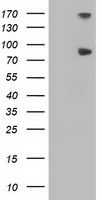FGFR2 Mouse Monoclonal Antibody [Clone ID: OTI3B3]
CAT#: CF502877
Carrier-free (BSA/glycerol-free) FGFR2 mouse monoclonal antibody, clone OTI3B3 (formerly 3B3)
Formulation: Standard
Specifications
| Product Data | |
| Clone Name | OTI3B3 |
| Applications | IF, WB |
| Recommended Dilution | WB 1:200 - 1:1000, FLOW 1:100 |
| Reactivities | Human, Mouse, Rat |
| Host | Mouse |
| Isotype | IgG2a |
| Clonality | Monoclonal |
| Immunogen | Full length human recombinant protein of human FGFR2 (NP_000132) produced in HEK293T cell. |
| Formulation | Lyophilized powder (original buffer 1X PBS, pH 7.3, 8% trehalose) |
| Reconstitution Method | For reconstitution, we recommend adding 100uL distilled water to a final antibody concentration of about 1 mg/mL. To use this carrier-free antibody for conjugation experiment, we strongly recommend performing another round of desalting process. (OriGene recommends Zeba Spin Desalting Columns, 7KMWCO from Thermo Scientific) |
| Purification | Purified from mouse ascites fluids or tissue culture supernatant by affinity chromatography (protein A/G) |
| Conjugation | Unconjugated |
| Storage | Store at -20°C as received. |
| Stability | Stable for 12 months from date of receipt. |
| Predicted Protein Size | 89.7 kDa |
| Gene Name | fibroblast growth factor receptor 2 |
| Database Link | |
| Background | The protein encoded by this gene is a member of the fibroblast growth factor receptor family, where amino acid sequence is highly conserved between members and throughout evolution. FGFR family members differ from one another in their ligand affinities and tissue distribution. A full-length representative protein consists of an extracellular region, composed of three immunoglobulin-like domains, a single hydrophobic membrane-spanning segment and a cytoplasmic tyrosine kinase domain. The extracellular portion of the protein interacts with fibroblast growth factors, setting in motion a cascade of downstream signals, ultimately influencing mitogenesis and differentiation. This particular family member is a high-affinity receptor for acidic, basic and/or keratinocyte growth factor, depending on the isoform. Mutations in this gene are associated with Crouzon syndrome, Pfeiffer syndrome, Craniosynostosis, Apert syndrome, Jackson-Weiss syndrome, Beare-Stevenson cutis gyrata syndrome, Saethre-Chotzen syndrome, and syndromic craniosynostosis. Multiple alternatively spliced transcript variants encoding different isoforms have been noted for this gene. [provided by RefSeq] |
| Synonyms | BBDS; BEK; BFR-1; CD332; CEK3; CFD1; ECT1; JWS; K-SAM; KGFR; TK14; TK25 |
| Reference Data | |
| Protein Families | Druggable Genome, Protein Kinase, Secreted Protein, Transmembrane |
| Protein Pathways | Endocytosis, MAPK signaling pathway, Pathways in cancer, Prostate cancer, Regulation of actin cytoskeleton |
Documents
| Product Manuals |
| FAQs |
| SDS |
Resources
| Antibody Resources |
Other Versions
| SKU | Description | Size | Price |
|---|---|---|---|
| TA502877 | FGFR2 mouse monoclonal antibody, clone OTI3B3 (formerly 3B3) |
USD 447.00 |
|
| TA502877S | FGFR2 mouse monoclonal antibody, clone OTI3B3 (formerly 3B3) |
USD 159.00 |
|
| TA600364 | FGFR2 Capture mouse monoclonal antibody, ELISA and Luminex validated, clone OTI3B3 |
USD 379.00 |
|
| TA700365 | FGFR2 biotinylated detection antibody, ELISA and Luminex validated mouse monoclonal antibody, clone OTI3B3 |
USD 399.00 |
{0} Product Review(s)
Be the first one to submit a review






























































































































































































































































 Germany
Germany
 Japan
Japan
 United Kingdom
United Kingdom
 China
China









